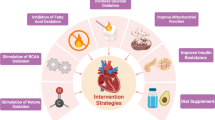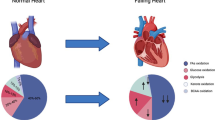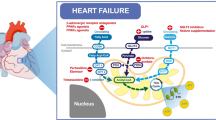Abstract
Heart failure (HF) is one of the most common cardiovascular diseases, causing large disease and economic burden worldwide. Impaired metabolic balance has been confirmed as a significant aspect of HF, and alteration of substrate utilization plays a vital role in the development of HF. Diabetes mellitus is strictly related with HF, and patients with diabetes show a higher mortality and morbidity of HF. Furthermore, HF patients and animals with diabetes behave different characteristics of metabolic pattern and substrate utilization comparing to those without diabetes. Recently, ketone body has been demonstrated as an alternative energy source in HF, which may improve myocardial energy supply and thus be adaptive for HF. Studies measured ketone body oxidation and production of ketone body metabolism in different groups of patients and animal models. This review focuses on the alteration of ketone body metabolism during HF and compares different results between diabetic and non-diabetic HF and the potential mechanism.
Similar content being viewed by others
References
Kolwicz JS, Airhart S, Tian R (2016) Ketones step to the plate: a game changer for metabolic remodeling in heart failure. Circulation 133(8):689–691
Puchalska P, Crawford PA (2017) Multi-dimensional roles of ketone bodies in fuel metabolism, signaling, and therapeutics. Cell Metab 25(2):262–284
Taegtmeyer H (2016) Failing heart and starving brain: Ketone Bodies to the Rescue. Circulation 134(4):265–266
Mudaliar S, Alloju S, Henry RR (2016) Can a shift in fuel energetics explain the beneficial cardiorenal outcomes in the EMPA-REG OUTCOME study? A Unifying Hypothesis. Diabetes Care 39(7):1115–1122
Cahill GF Jr (2006) Fuel metabolism in starvation. Annu Rev Nutr 26(26):1–22
Aubert G, Martin OJ, Horton JL, Lai L, Vega RB, Leone TC, Koves T, Gardell SJ, Krüger M, Hoppel CL, Lewandowski ED, Crawford PA, Muoio DM, Kelly DP (2016) The failing heart relies on ketone bodies as a fuel. Circulation 133(8):698–705
Lopaschuk GD, Ussher JR, Folmes CD, Jaswal JS, Stanley WC (2010) Myocardial fatty acid metabolism in health and disease. Physiol Rev 90(1):207–258
Glatz JF, Bonen A, Ouwens DM, Luiken JJ (2006) Regulation of sarcolemmal transport of substrates in the healthy and diseased heart. Cardiovasc Drugs Ther 20(6):471–476
Stanley WC, Recchia FA, Lopaschuk GD (2005) Myocardial substrate metabolism in the normal and failing heart. Physiol Rev 85(3):1093–1129
Karwi QG, Uddin GM, Ho KL, Lopaschuk GD (2018) Loss of metabolic flexibility in the failing heart. Front Cardiovasc Med 5:68
Garcia-Ropero A, Santos-Gallego CG, Zafar MU, Badimon JJ (2019) Metabolism of the failing heart and the impact of SGLT2 inhibitors. Expert Opin Drug Metab Toxicol 15(4):275–285
Bedi KC, Snyder NW, Brandimarto J, Aziz M, Mesaros C, Worth AJ, Wang LL, Javaheri A, Blair IA, Margulies KB, Rame JE (2016) Evidence for Intramyocardial disruption of lipid metabolism and increased myocardial ketone utilization in advanced human heart failure. Circulation 133(8):706–716
Tian Q, Barger PM (2006) Deranged energy substrate metabolism in the failing heart. Curr Hypertens Rep 8(6):465–471
Huynh K (2016) Heart failure: Ketone bodies as fuel in heart failure. Nat Rev Cardiol 13(3):122–123
Chandler MP, Kerner J, Huang H, Vazquez E, Reszko A, Martini WZ, Hoppel CL, Imai M, Rastogi S, Sabbah HN, Stanley WC (2004) Moderate severity heart failure does not involve a downregulation of myocardial fatty acid oxidation. Am J Physiol Heart Circ Physiol 287(4):H1538–H1543
Bell DS (2003) Heart failure: the frequent, forgotten, and often fatal complication of diabetes. Diabetes Care 26(8):2433–2441
Mizuno Y, Harada E, Nakagawa H, Morikawa Y, Shono M, Kugimiya F, Yoshimura M, Yasue H (2017) The diabetic heart utilizes ketone bodies as an energy source. Metabolism 77:65–72
Abdurrachim D, Teo XQ, Woo CC, Chan WX, Lalic J, Lam CSP, Lee PTH (2019) Empagliflozin reduces myocardial ketone utilization while preserving glucose utilization in diabetic hypertensive heart disease: a hyperpolarized 13 C magnetic resonance spectroscopy study. Diabetes Obes Metab 21(2):357–365
Gorter TM, Streng KW, van Melle JP, Rienstra M, Dickinson MG, Lam CSP, Hummel YM, Voors AA, Hoendermis ES, van Veldhuisen DJ (2018) Diabetes mellitus and right ventricular dysfunction in heart failure with preserved ejection fraction. Am J Cardiol 121(5):621–627
Kappel BA, Lehrke M, Sch Sc K et al (2017) Effect of empagliflozin on the metabolic signature of patients with type 2 diabetes Mellitus and Cardiovascular Disease. Circulation 136(10):969–972
Lopaschuk GD, Ussher JR (2016) Evolving concepts of myocardial energy metabolism: more than just fats and carbohydrates. Circ Res 119(11):1173–1176
Cotter DG, Schugar RC, Crawford PA (2013) Ketone body metabolism and cardiovascular disease. Am J Physiol Heart Circ Physiol 304(8):H1060–H1076
Sato K, Kashiwaya Y, Keon CA, Tsuchiya N, King MT, Radda GK, Chance B, Clarke K, Veech RL (1995) Insulin, ketone bodies, and mitochondrial energy transduction. FASEB J 9(8):651–658
Camici PG, Marraccini P, Lorenzoni R, Buzzigoli G, Pecori N, Perissinotto A, Ferrannini E, L'Abbate A, Marzilli M (1991) Coronary hemodynamics and myocardial metabolism in patients with syndrome X: response to pacing stress. J Am Coll Cardiol 17(7):1461–1470
Ferrannini E, Santoro D, Bonadonna R, Natali A, Parodi O, Camici PG (1993) Metabolic and hemodynamic effects of insulin on human hearts. Am J Phys 264(2 Pt 1):E308–E315
Ferrannini E, Mark M, Mayoux E (2016) CV Protection in the EMPA-REG OUTCOME Trial: A “Thrifty Substrate” hypothesis. Diabetes Care 39(7):1108–1114
Schugar RC, Moll AR, Andr R, d’Avignon D, Weinheimer CJ, Kovacs A, Crawford PA (2014) Cardiomyocyte-specific deficiency of ketone body metabolism promotes accelerated pathological remodeling. Mol Metab 3(7):754–769
Smith RJ, Goldfine AB, Hiatt WR (2016) Evaluating the cardiovascular safety of new medications for type 2 diabetes: time to reassess. Diabetes Care 39(5):738–742
Dei Cas A, Fonarow GC, Gheorghiade M, Butler J (2015) Concomitant diabetes mellitus and heart failure. Curr Probl Cardiol 40(1):7–43
Goldberg IJ, Trent CM, Schulze PC (2012) Lipid metabolism and toxicity in the heart. Cell Metab 15(6):805–812
Seferovii PM, Paulus WJ (2015) Clinical diabetic cardiomyopathy: a two-faced disease with restrictive and dilated phenotypes. Eur Heart J 36(27):1718–1727 1727a-1727c
Sharma S, Adrogue JV, Golfman L et al (2004) Intramyocardial lipid accumulation in the failing human heart resembles the lipotoxic rat heart. FASEB J 18(14):1692–1700
Doehner W, Frenneaux M, Anker SD (2014) Metabolic impairment in heart failure: the myocardial and systemic perspective. J Am Coll Cardiol 64(13):1388–1400
Rosenstein R, Hough A (2016) Empagliflozin, cardiovascular outcomes, and mortality in type 2 diabetes. N Engl J Med 374(11):1093–1094
Ferrannini E, Baldi S, Frascerra S, Astiarraga B, Heise T, Bizzotto R, Mari A, Pieber TR, Muscelli E (2016) Shift to fatty substrate utilization in response to sodium-glucose cotransporter 2 inhibition in subjects without diabetes and patients with type 2 diabetes. Diabetes. 65(5):1190–1195
Cook GA, Lavrentyev EN, Pham K, Park EA (2017) Streptozotocin diabetes increases mRNA expression of ketogenic enzymes in the rat heart. Biochim Biophys Acta Gen Subj 1861(2):307–312
Prattichizzo F, De Nigris V, Micheloni S, La Sala L, Ceriello A (2018) Increases in circulating levels of ketone bodies and cardiovascular protection with SGLT2 inhibitors: is low-grade inflammation the neglected component. Diabetes Obes Metab 20(11):2515–2522
Kruljac I, Ćaćić M, Ćaćić P et al (2017) Diabetic ketosis during hyperglycemic crisis is associated with decreased all-cause mortality in patients with type 2 diabetes mellitus. Endocrine 55(1):139–143
Kutoh E, Hayashi J (2019) Effect of Canagliflozin on heart function involving ketone bodies in patients with type 2 cdiabetes. Drug Res (Stuttg) 69(5):297–300
Abdurrachim D, Woo CC, Teo XQ, Chan WX, Radda GK, Lee P (2019) A new hyperpolarized 13C ketone body probe reveals an increase in acetoacetate utilization in the diabetic rat heart. Sci Rep 9(1):5532
Janardhan A, Chen J, Crawford PA (2011) Altered systemic ketone body metabolism in advanced heart failure. Tex Heart Inst J 38(5):533–538
Nagao M, Toh R, Irino Y, Mori T, Nakajima H, Hara T, Honjo T, Satomi-Kobayashi S, Shinke T, Tanaka H, Ishida T, Hirata KI (2016) β-Hydroxybutyrate elevation as a compensatory response against oxidative stress in cardiomyocytes. Biochem Biophys Res Commun 475(4):322–328
Ho KL, Zhang L, Wagg C, al Batran R, Gopal K, Levasseur J, Leone T, Dyck JRB, Ussher JR, Muoio DM, Kelly DP, Lopaschuk GD (2019) Increased ketone body oxidation provides additional energy for the failing heart without improving cardiac efficiency. Cardiovasc Res 115:1606–1616
Uchihashi M, Hoshino A, Okawa Y, Ariyoshi M, Kaimoto S, Tateishi S, Ono K, Yamanaka R, Hato D, Fushimura Y, Honda S, Fukai K, Higuchi Y, Ogata T, Iwai-Kanai E, Matoba S (2017) Cardiac-Specific Bdh1 Overexpression Ameliorates Oxidative Stress and cardiac remodeling in pressure overload-induced heart failure. Circ Heart Fail 10(12)
Verma S, Rawat S, Ho KL, Wagg CS, Zhang L, Teoh H, Dyck JE, Uddin GM, Oudit GY, Mayoux E, Lehrke M, Marx N, Lopaschuk GD (2018) Empagliflozin increases cardiac energy production in diabetes: novel translational insights into the heart failure benefits of SGLT2 inhibitors. JACC Basic Transl Sci 3(5):575–587
Horton JL, Davidson MT, Kurishima C, Vega RB, Powers JC, Matsuura TR, Petucci C, Lewandowski ED, Crawford PA, Muoio DM, Recchia FA, Kelly DP (2019) The failing heart utilizes 3-hydroxybutyrate as a metabolic stress defense. JCI Insight 4(4)
Funding
This study was funded by grants from the National Natural Science Foundation of China (No.81670235).
Author information
Authors and Affiliations
Corresponding author
Ethics declarations
Conflict of interest
The authors declare that they have no conflict of interest.
Ethical approval
This article does not contain any studies with human participants or animals performed by any of the authors.
Additional information
Publisher’s note
Springer Nature remains neutral with regard to jurisdictional claims in published maps and institutional affiliations.
Rights and permissions
About this article
Cite this article
Qian, N., Wang, Y. Ketone body metabolism in diabetic and non-diabetic heart failure. Heart Fail Rev 25, 817–822 (2020). https://doi.org/10.1007/s10741-019-09857-3
Published:
Issue Date:
DOI: https://doi.org/10.1007/s10741-019-09857-3




